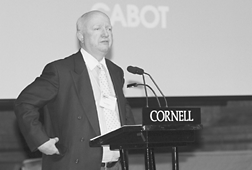More funding for physical sciences is urged by U.S. Commerce Dept. nominee
By David Brand & Jeff Evans '01

Samuel Bodman, the recently nominated U.S. deputy secretary of commerce, told an audience of prominent engineers and researchers last Friday that Washington is not doing enough to fund physical sciences, math, chemistry, physics and engineering. "I'm going to try to work on that," he said.
A Cornell graduate (1960 in chemical engineering), Bodman has been chief executive of Cabot Corp. for the past 15 years and will relinquish his job as chairman next month. Speaking at the annual conference of the Cornell Society of Engineers in Barnes Hall, April 6, Bodman voiced the hope that he could "be a spokesman" for the sciences in his tenure at the U.S. Commerce Department.
"I think more money and more effort needs to go into the physical sciences. We are doing a great job as a country funding biological sciences, but much less on physical sciences, math, chemistry, physics and engineering in my view," said Bodman, who is a former associate professor of chemical engineering at the Massachusetts Institute of Technology. He conceded that changing that balance is "not too popular now in Washington."
President Bush's budget request to Congress, released on Feb. 28, is clearly balanced in favor of the biomedical sciences. The plan would raise funding for the National Institutes of Health to $23.1 billion, a 13.8 percent increase from fiscal 2001. By comparison, the National Science Foundation and NASA would receive increases of 2 percent or less, which would be below the expected rate of inflation.
Bodman's most direct connection with scientific research will be through his oversight of the National Oceanic and Atmospheric Administration and of the National Institute of Standards and Technology, both agencies of the Commerce Department.
The deputy secretary was asked by an audience member what he hoped to achieve in his new job. "I'm going down there, one, because I felt it was the right time to leave what I am doing [at Cabot], and, two, because they asked me, I didn't apply for it," he said.
Bodman was one of more than 20 speakers at the conference April 5 to 7, which had the theme "Creating Successful Technology-Based Businesses."
Opening the conference, President Hunter Rawlings noted that an academic "is someone who sees something working in practice and wonders if it will work in theory." Cornell, he said, has never fit that stereotype but has a tradition of carrying out both applied and theoretic research and transferring the fruits of its investigations to the marketplace.
In the opening lecture, April 5 in Upson Hall, David Welch, chief technical officer and vice president of corporate development of SDL Inc., pointed out the challenge of fiber optics communications for entrepreneurs. Out of the 100 start-up companies in the field founded within the last three years, he said, intense competition will reduce the number to approximately five within a few years.
Welch said that this shakeout will occur even as fiber optics paves the way for faster data transmission as the information age grows in scale. Yet, he said, many of the components necessary to maintain fiber optics communications networks were not developed until 1990 and beyond.
"Before 1996, the fiber optics industry in all practicality didn't exist," said Welch, who received his Ph.D. in electrical engineering from Cornell in 1985.
Demand for data transmission has grown rapidly since the beginning of
the Internet's mass popularity, so that by 1999 information transmission traffic exceeded that of voice transmission. Welch said the challenge lies in reducing the cost of laying down fiber optics lines and their attending components for the different types of network infrastructure throughout the world.
"The Achilles heel of optics technologies is the large amount of components in comparison to other technologies," said Welch.
Media Contact
Get Cornell news delivered right to your inbox.
Subscribe